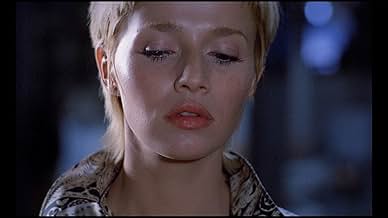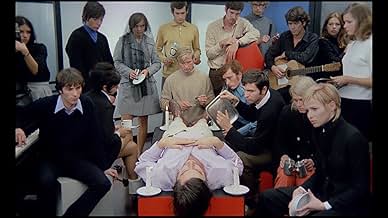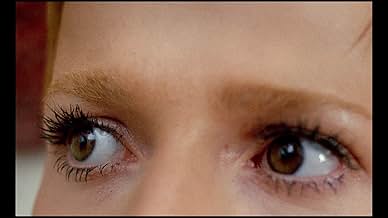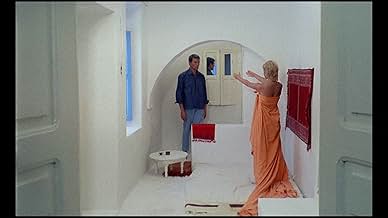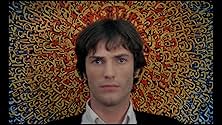IMDb RATING
6.4/10
1.5K
YOUR RATING
A group of French students are drawn into the psychological and sexual games of a mysterious Dutchman. Once they sample his "fear powder" the students experience a series of hallucinations.A group of French students are drawn into the psychological and sexual games of a mysterious Dutchman. Once they sample his "fear powder" the students experience a series of hallucinations.A group of French students are drawn into the psychological and sexual games of a mysterious Dutchman. Once they sample his "fear powder" the students experience a series of hallucinations.
- Director
- Writer
- Stars
- Awards
- 1 nomination total
Jarmila Kolenicová
- Sonia
- (as Jarmila Kolenicova)
Ludovít Króner
- Franc
- (as Ludwik Kroner)
Eva Luther
- Violette's look-a-like
- (uncredited)
- Director
- Writer
- All cast & crew
- Production, box office & more at IMDbPro
Featured reviews
I knew of novelist Alain Robbe-Grillet chiefly by virtue of his script for Alain Resnais’ art-house masterpiece LAST YEAR IN MARIENBAD (1961; which I intend to revisit in tribute to the author). Eventually, I became aware of his own films as a director via a thread on “The Latarnia Forums” – which, back then, had intrigued me a great deal and, in fact, was highly pleased to acquire three of them a few months ago. Unfortunately, the prints were incredibly murky – so I kind of lost my enthusiasm and it’s only now, in honor of his passing, that I made a concentrated effort to stick with them!
However, my first encounter with these titles proved a disappointment: as I said, the picture quality left a lot to be desired – but, frankly, so did the film itself! Judging by the celebrated Resnais work, I knew I’d be in for an oblique and possibly multi-layered piece – however, to be honest, I found it made little sense and that it was generally weird for weirdness’ sake! In fact, if I had to compare Robbe-Grillet’s style here with that of contemporaneous film-makers, I’d say this is Godard meets Antonioni meets Jodorowsky!; that, in itself, would sound like a most interesting proposition to some…but, I assure you, the film is a bit of a bore despite plenty of nudity (the writer-director seems to have a thing for sadomasochism, as can also be seen from TRANS-EUROP-EXPRESS [1966]) and a stunning-looking heroine in Catherine Jourdan (sporting cropped blonde hair).
The plot, such as it is, has to do with a group of disaffected students who are shown a way out of their ennui (via a concoction he offers) by a man they meet at a café (the Eden of the title); Jourdan is supposed to have a night-time tryst with him at a factory but, on arriving for the appointment, she is intimidated by some of her fellow students and finds the man dead! Taking a clue from a postcard of an Arabian town found in the stranger’s pocket, Jourdan gets mixed-up in espionage (the MacGuffin in this case being a valuable missing portrait), games of a sexual nature, drug-induced hallucinations and murder; eventually, we come full circle and the story returns to the Eden and the arrival once again of the stranger...
However, my first encounter with these titles proved a disappointment: as I said, the picture quality left a lot to be desired – but, frankly, so did the film itself! Judging by the celebrated Resnais work, I knew I’d be in for an oblique and possibly multi-layered piece – however, to be honest, I found it made little sense and that it was generally weird for weirdness’ sake! In fact, if I had to compare Robbe-Grillet’s style here with that of contemporaneous film-makers, I’d say this is Godard meets Antonioni meets Jodorowsky!; that, in itself, would sound like a most interesting proposition to some…but, I assure you, the film is a bit of a bore despite plenty of nudity (the writer-director seems to have a thing for sadomasochism, as can also be seen from TRANS-EUROP-EXPRESS [1966]) and a stunning-looking heroine in Catherine Jourdan (sporting cropped blonde hair).
The plot, such as it is, has to do with a group of disaffected students who are shown a way out of their ennui (via a concoction he offers) by a man they meet at a café (the Eden of the title); Jourdan is supposed to have a night-time tryst with him at a factory but, on arriving for the appointment, she is intimidated by some of her fellow students and finds the man dead! Taking a clue from a postcard of an Arabian town found in the stranger’s pocket, Jourdan gets mixed-up in espionage (the MacGuffin in this case being a valuable missing portrait), games of a sexual nature, drug-induced hallucinations and murder; eventually, we come full circle and the story returns to the Eden and the arrival once again of the stranger...
Philosophical thriller or Post-Modern jigsaw or S&M skinflick - or all three at once - Alain Robbe-Grillet's first colour film is a dazzling, at times frustrating experience. Try to imagine Alice in Wonderland crossed with Story of O and you may get some idea of the perverse sensibility at work behind it. Starting off in a labyrinthine, mirror-lined nightclub called Eden, moving on to a disused factory with huge industrial vats full of sperm, ending up on the Tunisian island of Djerba - with, naturally, a detour through a jet-set torture chamber where glamorous naked women are crucified or suspended in cages - Robbe-Grillet takes his wide-eyed and waif-like heroine (Catherine Jourdan) on a spiritual and erotic odyssey to...what exactly? Sorry, but I don't know either.
Nor does Robbe-Grillet seem the tiniest bit inclined to let us in on the secret. According to a mysterious stranger (Pierre Zimmer) who breaks in on Jourdan and her jaded pals, it's something to do with transcending the limits of rational Western consciousness. Finding a darker and more primitive reality. "Break on through to the other side" - or so The Doors might put it. Intriguing enough in a drugged-up late 60s kind of way, but Robbe-Grillet's own personal "doors of perception" don't seem to open very far beyond a spot of mild flagellation, or some Emmanuelle-style sex tourism on a photogenic Third World beach.
At least the film is exquisite to behold. Its imagery is bizarre and erotic and disturbing. Catherine Jourdan - who went on to make even weirder movies with director/husband Alain Fleischer - is a lovely heroine in the tradition of the Marquis de Sade's Justine. She combines the doe-eyed fragility of a Mia Farrow with the icy blonde sensuality of a Catherine Deneuve. As her lover, Richard Leduc is undeniably handsome - but he seems far too sweet and mild-mannered for some seriously nasty sex-games with a blindfold and a bucket of scorpions. As for any ultimate meaning, you may or may not want to work that out. I suspect most of us would be happier not knowing.
Incidentally, Eden and After is one of Robbe-Grillet's MORE linear films in terms of plot - yet it's also one of his hardest to grasp. Perhaps there's a lesson to be learned from that, but - once again - don't ask me what!
David Melville
Nor does Robbe-Grillet seem the tiniest bit inclined to let us in on the secret. According to a mysterious stranger (Pierre Zimmer) who breaks in on Jourdan and her jaded pals, it's something to do with transcending the limits of rational Western consciousness. Finding a darker and more primitive reality. "Break on through to the other side" - or so The Doors might put it. Intriguing enough in a drugged-up late 60s kind of way, but Robbe-Grillet's own personal "doors of perception" don't seem to open very far beyond a spot of mild flagellation, or some Emmanuelle-style sex tourism on a photogenic Third World beach.
At least the film is exquisite to behold. Its imagery is bizarre and erotic and disturbing. Catherine Jourdan - who went on to make even weirder movies with director/husband Alain Fleischer - is a lovely heroine in the tradition of the Marquis de Sade's Justine. She combines the doe-eyed fragility of a Mia Farrow with the icy blonde sensuality of a Catherine Deneuve. As her lover, Richard Leduc is undeniably handsome - but he seems far too sweet and mild-mannered for some seriously nasty sex-games with a blindfold and a bucket of scorpions. As for any ultimate meaning, you may or may not want to work that out. I suspect most of us would be happier not knowing.
Incidentally, Eden and After is one of Robbe-Grillet's MORE linear films in terms of plot - yet it's also one of his hardest to grasp. Perhaps there's a lesson to be learned from that, but - once again - don't ask me what!
David Melville
Yikes, talk about self-indulgent. It does start off quite frighteningly as a girl is ambushed in an office by a group of colleagues and stripped on what looks like a sacrificial table! Then we discover that it's nothing more than a bunch of bored and wired students who have nothing better to do than play their own version of psycho-cleudo. Then they encounter the enigmatic "Duchemin" (Pierre Zimmer) who regales them with stories of his time in North Africa and of a special powder that could change their lives for ever. Gullible as they are, off we head to some beautifully pristine Tunisian seaside adobe homes where the rest of this plays out. Surreal is putting the rest of this mildly, so don't be looking for anything akin to a traditional plot as the group start to hallucinate and partake in some real Marquis de Sade kind of stuff. Perhaps it's meant to be erotic - but nudity in itself (almost exclusively female) is not necessarily sexy nor provocative. For the last half hour or so, you could easily be forgiven for thinking you're watching a "Playboy" shoot. To be fair, the randomness and unpredictability does work at times and the whole thing keeps you on your toes for a while, but as it gets towards what passes for a conclusion, I felt that perhaps I'd have volunteered for one of the venomous little scorpions that may (or, of course, may not) have featured earlier. It's far too long, far too slow and no attempt is made to develop any form of characterisation amongst these pretty introspective young folks who are easy pickings for their new mentor. It's was showcased at the abandoned 1970 Berlinale and though I am glad I watched it, I shall never bother watching it again.
If this were in English, you might think it was a particularly pretentious student film by some young director who wanted to get as many pretty women to submit to dubious situations as he could. Rather, it is the epitome of why even many French filmmakers turned to American features to revive their own cinema which so often veers towards this kind of aimless, flimsily produced exercise in some indistinct intellectual exploration. What is going on? Well, apparently some bored very bourgeois students are trying to find ways - literal or fantasized, it's not clear which - to spice up their boring hours in the school hangout (realistically portrayed as the kind of sterile glass and colored panelled institutional space many are). There's a kind of an older Svengali figure who leads them some semi-comprehensible, vaguely erotic games. There are references to death, self-inflicted or other. There are a number of beautiful shots of whitewashed buildings against blue skies in North Africa. You get a few women in cages (mysteriously keeping on blindfolds thought their hands are free) and one recurring fleeting shot of what looks like some serious bondage, a touch of David Lynch-style soft-porn lesbianism - something for everyone really who likes this kind of film at all, with no particular order or logic.
If you loved "Last Year at Marienbad", you might at least find this film intriguing. Otherwise, you might be relieved that French directors changed direction enough to come up with "Diva". ("Does this review contain spoilers?" They should probably come up with a prize for anyone who could MANAGE to write a spoiler for this film.)
If you loved "Last Year at Marienbad", you might at least find this film intriguing. Otherwise, you might be relieved that French directors changed direction enough to come up with "Diva". ("Does this review contain spoilers?" They should probably come up with a prize for anyone who could MANAGE to write a spoiler for this film.)
Did you know
- TriviaItalian censorship visa # 57570 delivered on 5 February 1971.
- ConnectionsEdited into N. a pris les dés... (1972)
- How long is Eden and After?Powered by Alexa
Details
Contribute to this page
Suggest an edit or add missing content

